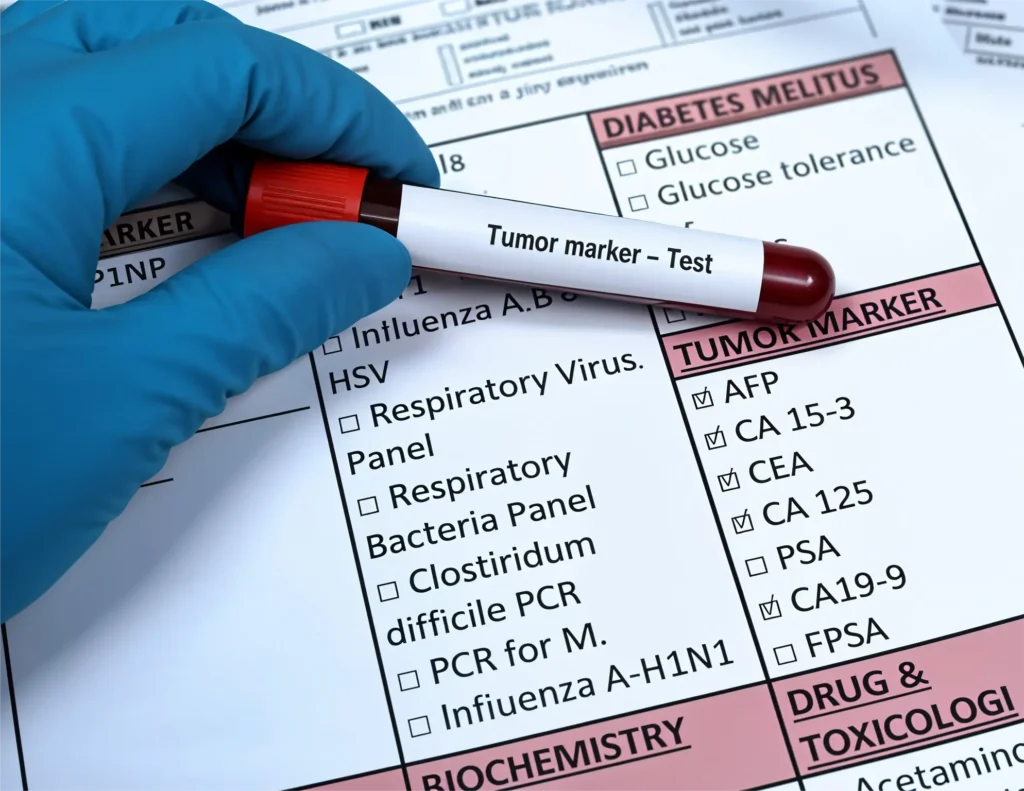Blood Tests for Cancer are one of the first tools doctors use to check your health when something doesn’t feel right. They are simple, fast, and can give important clues about what’s going on inside your body. These tests might not confirm cancer on their own, but they help doctors decide if more testing is needed. In this blog, we’ll explain everything you need to know about cancer blood tests—how they work, what they check, and what happens next.
Blood Tests for Cancer
Blood tests for cancer are one of the primary diagnostic tools used in the early detection, staging, and monitoring of various cancers. While not all cancers can be found through blood work, certain tests provide vital clues about abnormal changes in the body, especially in cancers that affect blood cells, such as leukemia, lymphoma, and multiple myeloma.
Does Cancer Show up in Blood Work?
While not every cancer type will manifest in routine Blood tests for cancer, some do. Blood cancers such as leukemia, lymphoma, and multiple myeloma are particularly detectable through blood abnormalities. Certain solid tumors can also cause detectable changes, such as elevated enzymes or the presence of tumor markers.
- Can a blood test detect cancer in the body? Blood tests are not diagnostic alone but can reveal patterns that warrant further testing. For example, elevated liver enzymes might suggest metastatic liver cancer.
- Doctors often pair blood testing with imaging (CT, MRI, PET) or biopsies to confirm a diagnosis and monitor treatment progress.
Blood Chemistry Test
A blood chemistry panel provides insight into how organs are functioning and whether cancer has affected vital systems.
- Liver function markers: Elevated AST, ALT, and bilirubin could point to liver damage from metastatic cancer.
- Kidney function: High creatinine or BUN levels may result from cancer affecting the kidneys or from side effects of chemotherapy.
- Electrolyte imbalances: Abnormal calcium may indicate bone cancers or metastasis.
Blood Protein Testing
This test evaluates abnormal immunoglobulin levels that could suggest blood-related cancers like multiple myeloma.
- Electrophoresis identifies unusual bands or spikes in protein concentrations—particularly monoclonal proteins (M-proteins).
- These patterns can guide further testing like immunofixation or bone marrow biopsy.
Blood Smear
A manual microscopic exam of a stained blood sample allows for visualization of abnormalities not seen in automated tests.
- Abnormal cells like blast cells, Auer rods, or smudge cells are key indicators of leukemias and help sub-type the disease.
- Size, shape, and maturity of red cells, white cells, and platelets give clues about various hematological malignancies.
Circulating Tumor Cell Test
This emerging test is especially useful in solid tumors and is often used to monitor progression rather than for initial diagnosis.
- It helps in detecting recurrence or metastasis in breast, prostate, and colorectal cancer.
- Technologies like CellSearch® are FDA-approved for monitoring certain metastatic cancers, helping tailor ongoing treatment.
Complete Blood Count (CBC)
How to detect blood cancer in CBC report is a frontline diagnostic test for blood cancers and may also provide indirect evidence of other malignancies.
- How to detect blood cancer in CBC report: Look for extremely high or low WBCs, presence of immature white cells, anemia (low hemoglobin), and abnormal platelet counts.
- Leukemia often presents with blast cells in peripheral blood, while lymphoma might present with anemia and leukopenia due to bone marrow involvement.
Cytogenetic Analysis
Cytogenetic testing looks for chromosomal changes that are often diagnostic of specific cancers.
- Examples include Philadelphia chromosome (t(9;22)) in chronic myeloid leukemia or t(15;17) in acute promyelocytic leukemia.
- It is essential for confirming certain cancer types and for choosing targeted therapies.
Flow Cytometry
Flow cytometry is especially vital for blood cancers and immunophenotyping.
- It measures cell size, complexity, and surface markers using fluorescent antibodies, enabling precise classification of lymphoma and leukemia subtypes.
- It also helps detect minimal residual disease (MRD) after treatment, a key in modern cancer management.
Tumor Marker Blood Test
Tumor markers are substances released by cancer cells or by normal cells in response to cancer.
- Elevated CEA (carcinoembryonic antigen) may indicate colorectal or pancreatic cancer.
- AFP (alpha-fetoprotein) can signal liver or testicular cancer.
- In Cancer screening blood tests for females, markers like CA-125 (ovarian), CA 15-3 (breast), and HE4 are often used for early detection and monitoring.
Types of Blood Tests for Cancer Diagnosis
Blood tests are essential tools in the early detection, diagnosis, and monitoring of various cancers. Although blood tests alone do not confirm cancer, they can reveal abnormalities that may suggest the presence of cancer and guide the need for further investigation. Blood Cancer Tests & Screenings, especially, are pivotal in identifying cancers like leukemia, lymphoma, and multiple myeloma.
Key Types of Blood Tests for Cancer
- Complete Blood Count (CBC)
A CBC evaluates the number and types of blood cells. It can help detect blood cancers like leukemia and lymphoma by revealing abnormal white blood cell counts, low red blood cells, or abnormal platelets.
▸ How to detect blood cancer in CBC report: Unusually high or low white blood cell counts, presence of immature cells (blasts), and low hemoglobin levels can raise suspicion of blood cancers. - Tumor Marker Tests
These tests measure substances (proteins, antigens) released by cancer cells. While not definitive, elevated tumor markers may point to specific cancers.
▸ Examples include PSA (Prostate Cancer), CA-125 (Ovarian Cancer), and AFP (Liver Cancer). These tests are often used to monitor treatment or recurrence rather than initial diagnosis. - Peripheral Blood Smear
This test provides a visual assessment of blood cells under a microscope. Irregular shapes or sizes of cells can signal blood cancers or marrow disorders.
▸ The morphology of cells can indicate the presence of leukemia cells or other abnormalities that aren’t evident in a basic CBC. - Immunophenotyping (Flow Cytometry)
This test identifies specific types of blood cells based on markers on their surface. It is critical in diagnosing various leukemias and lymphomas.
▸ By analyzing the surface proteins of cells, doctors can distinguish between different cancer subtypes, aiding precise diagnosis and treatment planning. - Blood Protein Testing (Electrophoresis)
It identifies abnormal proteins in the blood, often seen in multiple myeloma. The presence of monoclonal proteins (M proteins) is a hallmark of this disease.
▸ It separates blood proteins based on their electric charge, highlighting abnormal spikes that may indicate plasma cell disorders. - Circulating Tumor DNA (ctDNA) Test
This advanced test detects small fragments of tumor DNA in the bloodstream. Though still emerging, it’s promising for early detection and treatment monitoring.
▸ ctDNA testing can track genetic mutations associated with cancer, offering a less invasive option for diagnosis and disease progression. - Hormone Level Tests
Some cancers, such as thyroid or adrenal cancers, may alter hormone levels. Blood tests measuring these hormones can help detect endocrine tumors.
▸ These are often used alongside imaging and biopsies to confirm the origin and type of cancer affecting hormone-producing glands. - Cancer Screening Blood Tests for Females
▸ Women may undergo blood tests like CA-125 (ovarian cancer), hCG (gestational trophoblastic tumors), and BRCA mutation testing via genetic screening.
▸ These screenings are often recommended for high-risk individuals or those with family histories of cancer.
Can Blood Tests Detect Tumors?
Blood tests can sometimes detect tumors by identifying abnormal substances like tumor markers, circulating tumor cells (CTCs), or DNA fragments from cancer cells (ctDNA). Though not all tumors show up in blood tests, these tools are useful for early detection, monitoring, and treatment planning.
Key Points
- Tumor Markers
▸ Substances like CA-125 (ovarian) or PSA (prostate) may indicate cancer when elevated.
▸ Used for detection, monitoring, and assessing recurrence. - Circulating Tumor DNA (ctDNA)
▸ Detects fragments of tumor DNA in the bloodstream.
▸ Offers insight into cancer type and genetic mutations. - Can a Blood Test Detect Cancer in the Body?
▸ In some cases, yes—especially blood cancers and tumors that shed markers.
▸ Often paired with imaging for confirmation. - Cancer Screening Blood Tests for Females
▸ Includes CA-125, hCG, and BRCA gene tests.
▸ Helps with early detection in high-risk women.
How Do Cancer Blood Tests Work?
Cancer blood tests work by analyzing components in your blood that may indicate the presence of cancer. These components include tumor markers, abnormal cells, DNA fragments, and protein levels. While not always definitive, these tests provide vital clues about cancer presence, progression, and treatment response.
Key Mechanisms of Cancer Blood Tests
- Tumor Marker Detection
Blood tests identify specific substances (e.g., CA-125, PSA, CEA) that are elevated when certain cancers are present.
▸ These markers may help monitor tumor growth, treatment effectiveness, or cancer recurrence. - Circulating Tumor DNA (ctDNA)
Cancer cells release small DNA fragments into the bloodstream.
▸ High-sensitivity tests detect this DNA to provide information about genetic mutations and cancer type. - CBC and Blood Cancer Indicators
CBC helps assess abnormalities in blood cell counts.
▸ Elevated or reduced white blood cells, low hemoglobin, or platelets may suggest leukemia or lymphoma. - Cancer Screening Blood Tests for Females
▸ Women may undergo tests like CA-125 (ovarian), hCG (germ cell tumors), or BRCA gene testing to detect cancer or assess risk.
▸ These tests support early detection in high-risk individuals.
Cancer Diagnosis at HCG
HCG Cancer Centre follows a multidisciplinary and precision-based approach to cancer diagnosis, integrating cutting-edge blood tests with advanced imaging and pathology. Their diagnostics are tailored to detect cancer early, classify its type accurately, and guide personalized treatment plans.
Key Diagnostic Services at HCG
- Blood Tests for Cancer
Includes CBC, tumor markers, ctDNA, and blood protein tests.
▸ These help detect signs of blood-related cancers and tumor activity throughout the body. - Blood Cancer Tests & Screenings
CBC with peripheral smear, immunophenotyping, and molecular profiling are conducted for leukemia, lymphoma, and myeloma.
▸ How to detect blood cancer in CBC report: Look for abnormal white blood cells, low platelets, or blasts in the peripheral smear. - Cancer Screening Blood Tests for Females
▸ Tests like CA-125 (ovarian), BRCA1/2 (breast), and hCG (germ cell tumors) are offered for early cancer detection in women.
▸ These are especially important for individuals with family history or genetic predispositions. - Can a Blood Test Detect Cancer in the Body?
▸ At HCG, blood tests are used as an essential first step to flag abnormalities, track mutations, and guide further investigations like PET-CT or biopsy.
How to Prepare for a Blood Test
Proper preparation ensures accurate results and minimizes discomfort.
- Fasting Requirements: Confirm whether fasting is necessary. Tests like blood sugar, triglycerides, or lipid panels require it.
- Avoid Strenuous Exercise: Intense physical activity before the test may alter enzyme or hormone levels.
- Avoid Alcohol and Certain Foods: Some blood tests for cancer are sensitive to alcohol or foods rich in vitamin C or iron.
What Happens During the Blood Test Procedure?
The procedure is straightforward but can vary depending on the type and number of tests.
- The technician ties a tourniquet around the upper arm to make veins more visible. After sterilizing the skin, a needle is inserted into a vein to draw blood.
- After the sample is collected, pressure is applied to stop bleeding, and a bandage is placed. Discomfort is usually minimal.
How Long Do Blood Test Results Take?
Timeframes vary depending on test complexity and lab workflow.
- For blood tests for cancer, the results are often reviewed alongside imaging and biopsy findings for accurate interpretation.
- Same-day results are typical for CBC, blood chemistry, and routine panels.
- Specialized testing like tumor markers, flow cytometry, or cytogenetics, may take 3–7 days.
What Other Tests Will I Need to Get a Diagnosis?
Even if your blood test for cancer is abnormal, it doesn’t mean you have cancer for sure. Other tests help confirm a diagnosis:
- Imaging (CT, MRI, PET): Shows where cancer might be. Can a blood test detect cancer in the body?
- Biopsy: Removes a sample of tissue to look for cancer cells.
- Endoscopy: Uses a tube with a camera to look inside.
- Genetic Tests: Check your DNA for cancer-linked mutations.
All of these help create a full picture and a clear diagnosis.
Does Early Cancer Show in Blood Work?
Sometimes early cancers show in blood tests, especially blood cancers like leukemia and lymphoma. Changes in blood cell counts or the presence of tumor markers may point to a problem. But many solid tumors (like breast or lung cancer) don’t cause clear changes in early stages. That’s why cancer screening blood tests for females and males are important, even when you feel fine. They may catch cancer early enough for treatment to work better.
Test Details
How Do Cancer Blood Tests Work?
Cancer blood tests work by checking for abnormal cells, chemicals, or proteins in your blood. Your blood carries signals from every part of your body. When something’s wrong—like cancer growing—those signals can change. For example, a tumor may release markers into your blood, or your immune system may respond in ways that show up in the test. These tests don’t usually give a final answer but tell your doctor if more checks are needed.
How Do I Prepare for a Cancer Blood Test?
In most cases, there’s not much to do. But for certain tests, your doctor may ask you to:
- Fast for 8–12 hours (no food or drink)
- Avoid taking certain medications
- Stay hydrated
Tell your doctor about any vitamins, medicines, or herbal supplements you take. You should also share any symptoms you’ve been having. Preparing properly helps ensure accurate results from your blood tests for cancer.

What Should I Expect During Cancer Blood Work?
When you go for your test:
- A nurse or technician will clean your arm and use a needle to draw blood.
- You may feel a quick pinch, but it doesn’t hurt much.
- Blood is collected into tubes and sent to a lab.
- The whole thing usually takes less than 15 minutes.
It’s simple, quick, and safe. You can usually go home right after.
What Can I Expect After My Blood Work?
After your blood is drawn:
- You may have a small bruise or feel sore in your arm.
- Drink water and eat as normal unless told otherwise.
- You won’t feel any different from the blood being taken.
Your doctor will contact you when the results are ready. They’ll explain what everything means, especially if you had a cancer screening blood test for females or another specific test done.
What Are the Risks or Side Effects of a Blood Test for Cancer?
Blood tests are very safe. Some possible side effects include:
- Mild pain or bruising at the needle site
- Dizziness or lightheadedness (rare)
- Infection or bleeding (very rare)
You can lower the risk by keeping the area clean and following your nurse’s advice. Compared to the helpful information it gives, the risk from a blood tests for cancer is extremely low.
Results and Follow-Up
When Will I Know the Results of My Test?
It depends on the test:
- Basic blood tests may be ready in a few hours.
- Tumor marker tests or protein tests might take a few days.
- Your doctor will let you know when to expect the results.
Sometimes results are sent directly to your patient portal, or your doctor will call you. Make sure to follow up even if you feel okay—blood cancer tests & screenings can catch problems before symptoms appear.
If My Results Are Abnormal, What Are the Next Steps?
Don’t panic. Abnormal doesn’t always mean cancer. It could be an infection, inflammation, or something minor. But if your doctor thinks cancer is possible:
- You may need a second blood test to confirm
- They may order a scan or biopsy
- You’ll likely meet a specialist
Next steps depend on the test results. Getting answers early helps doctors plan the right treatment if needed.
Conclusion
Blood tests for cancer are often the first step in finding something wrong before it becomes serious. They are safe, quick, and helpful tools that can guide your doctor to do more checks or rule out serious issues. While they don’t confirm cancer alone, they give strong clues. If something doesn’t feel right in your body, don’t ignore it. Ask for a check-up. Early testing can make a big difference, especially with regular blood cancer tests & screenings.
Read also Inflammatory Breast Cancer.




